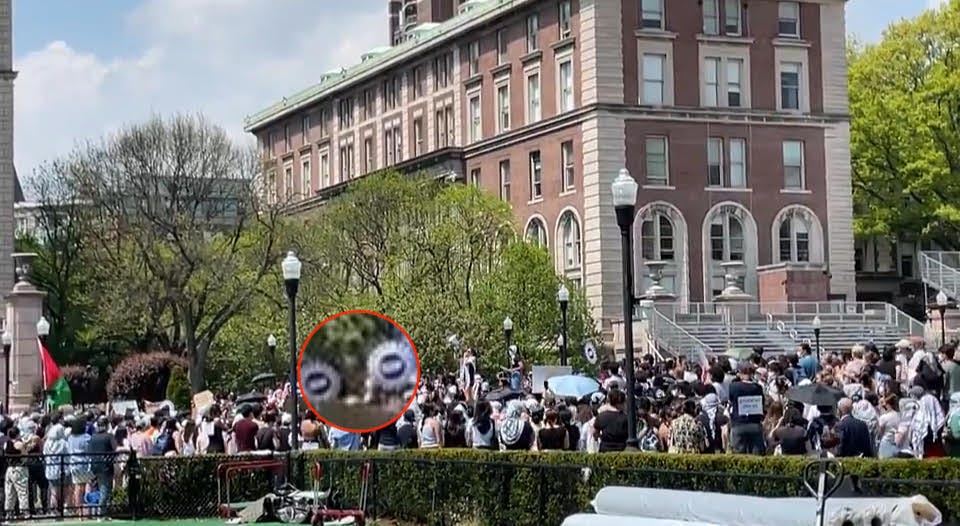UAW Involvement In And Support Of Pro-Palestinian Protests Raises Questions
"There is only one solution, a union-led revolution!" — GWU student protestors, Friday, May 3, 2024
By Peter List, Editor | May 4, 2024
With a large United Auto Workers (UAW) local considering striking over the crackdown on college-campus protests, the UAW’s continuing involvement in pro-Palestinian protests on college campuses this past week has sparked some online questions and debate about the role of labor unions in political and international affairs.
“…we want to realign our union to Palestinian solidarity, and the cease-fire is the first step” — UAW Region 9A director Brandon Mancilla
On Wednesday, following the arrests of protestors who had vandalized and occupied Columbia University’s Hamiliton Hall in New York City, as well as the violent clashes and arrests that occurred at UCLA in California, UAW President Shawn Fain took to Twitter to condemn the arrests, acknowledging that UAW members may have been among those arrested.
On Friday night, protests continued at universities across the U.S.
In this video, protestors outside George Washington University projected an image of Joe Biden on the wall of one of the campus buildings, while chanting “From the river to the sea, Palestine will be free!”, “There is only one solution, a student-led revolution!” and “There is only one solution, a union-led revolution!”
How is a union of ‘auto workers’ involved?
Observers outside of academia and the labor movement may be puzzled as to why a union known for representing auto workers is taking sides in a conflict half a world away.
Like other unions over recent decades, the United Auto Workers has diversified its membership into other areas of worker representation.
Today, the UAW represents a significant number of academic workers across the U.S., including 48,000 in the University of California system alone.
According to estimates a few years ago, the UAW had around 100,000 members on college campuses. However, this number has only increased since then.
With the amount of union organizing on college campuses over the past few years—the University of Pennsylvania saw 4,000 graduate students voting to unionize with the UAW in the past week—the UAW may now have nearly as many members on college campuses today as it does in auto plants.
UAW’s “Palestinian Solidarity” and Involvement in Protests
The most recent UAW involvement in pro-Palestinian protests is not the union’s first. Nearly a decade ago, while the UAW was under different leadership, UAW Local 2865—which not has 36,000 teaching assistants and student-workers at the University of California—passed a resolution calling on the UAW International to endorse the Boycott, Divest, and Sanctions (BDS) movement against Israel.
A total of 2,168 votes were cast by union members, with 65 percent of them in favor of the measure directing the University of California and UAW International to divest their investment portfolios and pensions funds away from companies “complicit in severe and ongoing human rights violations as part of the Israeli oppression of the Palestinian people.”
In 2015, however, the UAW International Executive Board—again, under different leadership—nullified the resolution.
However, with new UAW leadership under President Shawn Fain and others, there has since been a “a profound shift in consciousness within the UAW.”
“Workers have strategically and in solidarity decided to become a part of this movement as workers, not just as students,” Region 9A director Brandon Mancilla told the pro-socialist Jacobin.
“Beginning in October, a lot of our members took to the streets, specifically wearing their UAW swag or carrying the UAW wheel with them,” Mancilla stated. “That was very much a sign of a demand for realignment — we want to realign our union to Palestinian solidarity, and the cease-fire is the first step.”
So when the student encampment movement took off, workers from our units, especially on the campuses, took to the occupations and participated. We have faculty members who are UAW standing in defense of their students.
UAW Labor for Palestine
Since October, UAW members and locals—largely from academia—have formed UAW Labor for Palestine, which has received notable press coverage.
In January, when the UAW endorsed Joe Biden for President, Biden was interrupted by a group of UAW members chanting “Ceasefire now!” before being dragged out of the conference by security.
Later the same day, the UAW protestors went on the Breaking Points video channel to explain their protest.
Earlier at the UAW conference, noted the Intercept’s Prem Thakker, Rep. Rashida Tlaib, D-Mich., addressed conference attendees and “received a standing ovation as she spoke about a ceasefire and solidarity with Palestine — something the UAW’s own Twitter account hailed.”
Criticism of UAW’s Involvement
This past week, online critics of the UAW’s involvement in the pro-Palestinian protests have garnered some attention from some prominent and not-so-prominent people on ‘X’ (formerly Twitter).
Gina Maiola, the Communications Director for Alabama Governor Kay Ivey, whose state the UAW will be holding an election at Mercedes later this month tweeted:
[Governor Ivey] repeatedly calls out the UAW as a special interest group with no interest in seeing Alabama workers succeed.
Need further proof? These are the same radicals joining for anti-Israel protests and taking over buildings at Columbia University.
Another ‘X’ user called out the protest “sponsorship” by the UAW.
One ‘X’ user asked whether the UAW supports Hamas and antisemtic.
The UAW’s support for pro-Palestinian protests during such a politically charged time raises questions about the potential impact on its broader membership and primary objectives to appeal to workers who may not share its pro-Palestinian objectives.
As the situation continues to unfold, though, the debate over the UAW’s role in these protests and its interests in Palestine is likely to persist.










